 Database
Database
 Mysql Tutorial
Mysql Tutorial
 MySQL optimization - specific analysis of additions, deletions and modifications (picture)
MySQL optimization - specific analysis of additions, deletions and modifications (picture)
MySQL optimization - specific analysis of additions, deletions and modifications (picture)
MySQL optimization - specific analysis of additions, deletions and modifications (picture)
Insert
will be more Row query results are inserted into the table
Syntax
INSERT INTO table_name1(column_list1) SELECT (column_list2) FROM table_name2 WHERE (condition)
table_name1 specifies the table into which data is to be inserted; column_list1 specifies which columns in the table to be inserted into which data is to be inserted; table_name2 specifies the data to be inserted from
Which table is queried from; column_list2 specifies the query column of the data source table. This list must have the same number of fields and the same data type as the column_list1 list;
condition specifies the query condition of the SELECT statement
Query all records from the person_old table and insert them into the person table
CREATE TABLE person ( id INT UNSIGNED NOT NULL AUTO_INCREMENT, NAME CHAR(40) NOT NULL DEFAULT '', age INT NOT NULL DEFAULT 0, info CHAR(50) NULL, PRIMARY KEY (id) ) CREATE TABLE person_old ( id INT UNSIGNED NOT NULL AUTO_INCREMENT, NAME CHAR(40) NOT NULL DEFAULT '', age INT NOT NULL DEFAULT 0, info CHAR(50) NULL, PRIMARY KEY (id) ) INSERT INTO person_old VALUES (11,'Harry',20,'student'),(12,'Beckham',31,'police') SELECT * FROM person_old

You can see that the records were inserted successfully and the person_old table now has Two records. Next, insert all the records in the person_oldperson_old table into the person table
INSERT INTO person(id,NAME,age,info) SELECT id,NAME,age,info FROM person_old; SELECT * FROM person

You can see that the data transfer is successful. The id field here is For auto-incremented primary keys, the uniqueness of the field value must be ensured when inserting. If it is not determined, the field can be ignored when inserting.
Only insert the values of other fields
If executed again An error will occur once

The difference between MYSQL and SQLSERVER:
Difference 1
When there are duplicate values in the data to be imported, MYSQL will have three options
Option 1: Use the ignore keyword
Option 2: Use replace into
Option Three: ON DUPLICATE KEY UPDATE
The second and third options will not be introduced here, because they are more complicated and do not meet the requirements. Only the first option will be discussed here
TRUNCATE TABLE person TRUNCATE TABLE persona_old INSERT INTO person_old VALUES (11,'Harry',20,'student'),(12,'Beckham',31,'police') ##注意下面这条insert语句是没有ignore关键字的 INSERT INTO person(id,NAME,age,info) SELECT id,NAME,age,info FROM person_old; INSERT INTO person_old VALUES (13,'kay',26,'student') ##注意下面这条insert语句是有ignore关键字的 INSERT IGNORE INTO person(id,NAME,age,info) SELECT id,NAME,age,info FROM person_old;
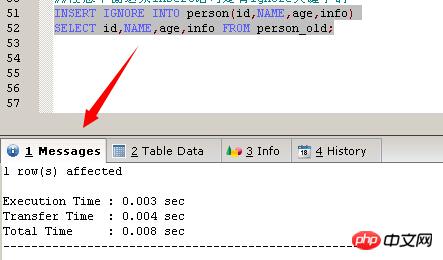
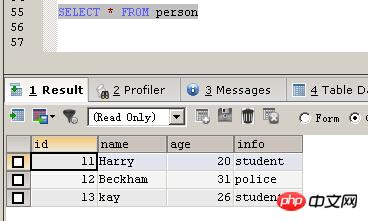
You can see that the insertion is successful
SQLSERVER
On the SQLSERVER side, if you want to ignore duplicate keys, you need Specify WITH (IGNORE_DUP_KEY=ON) when creating the table ON [ PRIMARY]
In this way, when inserting duplicate values, SQLSERVER will retain the value for the first time, and when duplicate values are found for the second time, SQLSERVER will ignore it. Get rid of
Difference 2
The difference when inserting an auto-increment column
SQLSERVER You need to use SETIDENTITY_INSERT table nameON to insert the value of the auto-increment field into the table. If you do not add SET IDENTITY_INSERT table name ON
When inserting data into the table, the value of the auto-increment field cannot be specified. The value of the id field cannot be specified. SQLSERVER will automatically increase it for you.一
INSERTINTO person(NAME,age,info) VALUES ('feicy',33,'student')
But MYSQL does not need it, and the degree of freedom is very large
you You can specify the value of the id field as NULL, and MYSQL will automatically add one for you.
INSERTINTO person(id,NAME,age,info) VALUES (NULL,'feicy',33,'student')

can also be used You can also specify the value
INSERT IGNORE INTO person(id,NAME,age,info) VALUES (16,'tom',88,'student')

without writing the value of the id. MYSQL will automatically add one for you.
INSERT IGNORE INTO person(NAME,age,info) VALUES ('amy',12,'bb')

You can specify the value of the id field or not. When specifying, as long as the current id field column does not have the value you are inserting, that is, there will be no duplicate values.
The degree of freedom is very large, and there is no need to specify SET IDENTITY_INSERT table name ON Options
Difference three
NULL value duplication problem of unique index
MYSQL
In MYSQL, the UNIQUE index will be invalid for null fields
insert into test(a) values(null) insert into test(a) values(null)
The above insert statement can be inserted repeatedly (the same is true for the joint unique index)
SQLSERVER
SQLSERVER will not work
CREATE TABLE person (
id INT NOT NULL IDENTITY(1,1),
NAME CHAR(40) NULL DEFAULT '',
age INT NOT NULL DEFAULT 0,
info CHAR(50) NULL,
PRIMARY KEY (id)
)
CREATE UNIQUE INDEX IX_person_unique ON [dbo].[person](name)
INSERT INTO [dbo].[person]
( [NAME], [age], [info] )
VALUES ( NULL, -- NAME - char(40)
1, -- age - int
'aa' -- info - char(50)
),
( NULL, -- NAME - char(40)
2, -- age - int
'bb' -- info - char(50)
)消息 2601,级别 14,状态 1,第 1 行 不能在具有唯一索引“IX_person_unique”的对象“dbo.person”中插入重复键的行。重复键值为 (<NULL>)。 语句已终止。
Update
The update is relatively simple, not much Said
UPDATE person SET info ='police' WHERE id BETWEEN 14 AND 17 SELECT * FROM person

删除
删除person表中一定范围的数据
DELETE FROM person WHERE id BETWEEN 14 AND 17 SELECT * FROM person

如果要删除表的所有记录可以使用下面的两种方法
##方法一 DELETE FROM person ##方法二 TRUNCATE TABLE person
跟SQLSERVER一样,TRUNCATE TABLE会比DELETE FROM TABLE 快
MYISAM引擎下的测试结果,30行记录
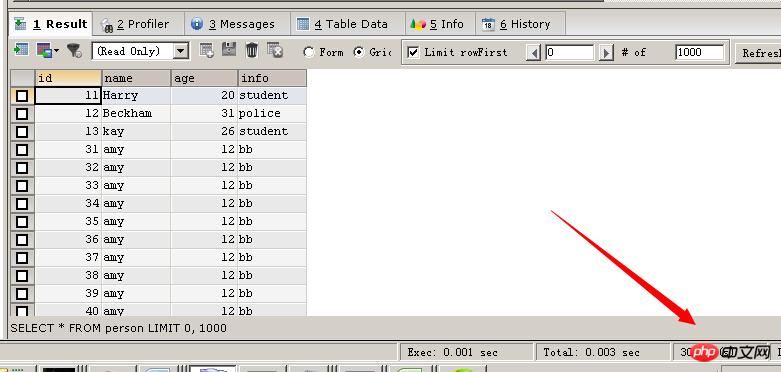
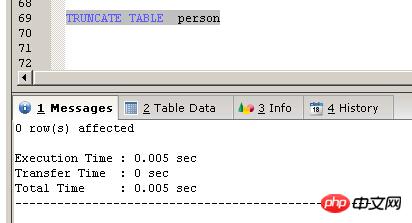
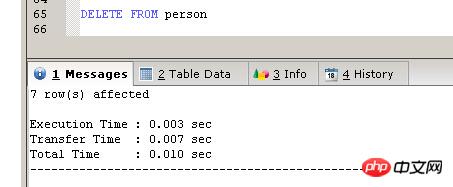
跟SQLSERVER一样,执行完TRUNCATE TABLE后,自增字段重新从一开始。
################################ INSERT IGNORE INTO person(id,NAME,age,info) SELECT id,NAME,age,info FROM person_old; SELECT * FROM person TRUNCATE TABLE person INSERT IGNORE INTO person(NAME,age,info) VALUES ('amy',12,'bb') SELECT * FROM person
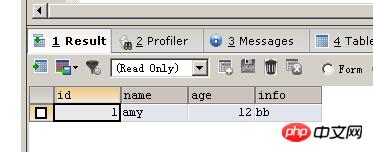
当你刚刚truncate了表之后执行下面语句就会看到重新从一开始
SHOW TABLE STATUS LIKE 'person'

The above is the detailed content of MySQL optimization - specific analysis of additions, deletions and modifications (picture). For more information, please follow other related articles on the PHP Chinese website!

Hot AI Tools

Undresser.AI Undress
AI-powered app for creating realistic nude photos

AI Clothes Remover
Online AI tool for removing clothes from photos.

Undress AI Tool
Undress images for free

Clothoff.io
AI clothes remover

Video Face Swap
Swap faces in any video effortlessly with our completely free AI face swap tool!

Hot Article

Hot Tools

Notepad++7.3.1
Easy-to-use and free code editor

SublimeText3 Chinese version
Chinese version, very easy to use

Zend Studio 13.0.1
Powerful PHP integrated development environment

Dreamweaver CS6
Visual web development tools

SublimeText3 Mac version
God-level code editing software (SublimeText3)

Hot Topics
 MySQL: An Introduction to the World's Most Popular Database
Apr 12, 2025 am 12:18 AM
MySQL: An Introduction to the World's Most Popular Database
Apr 12, 2025 am 12:18 AM
MySQL is an open source relational database management system, mainly used to store and retrieve data quickly and reliably. Its working principle includes client requests, query resolution, execution of queries and return results. Examples of usage include creating tables, inserting and querying data, and advanced features such as JOIN operations. Common errors involve SQL syntax, data types, and permissions, and optimization suggestions include the use of indexes, optimized queries, and partitioning of tables.
 MySQL's Place: Databases and Programming
Apr 13, 2025 am 12:18 AM
MySQL's Place: Databases and Programming
Apr 13, 2025 am 12:18 AM
MySQL's position in databases and programming is very important. It is an open source relational database management system that is widely used in various application scenarios. 1) MySQL provides efficient data storage, organization and retrieval functions, supporting Web, mobile and enterprise-level systems. 2) It uses a client-server architecture, supports multiple storage engines and index optimization. 3) Basic usages include creating tables and inserting data, and advanced usages involve multi-table JOINs and complex queries. 4) Frequently asked questions such as SQL syntax errors and performance issues can be debugged through the EXPLAIN command and slow query log. 5) Performance optimization methods include rational use of indexes, optimized query and use of caches. Best practices include using transactions and PreparedStatemen
 How to connect to the database of apache
Apr 13, 2025 pm 01:03 PM
How to connect to the database of apache
Apr 13, 2025 pm 01:03 PM
Apache connects to a database requires the following steps: Install the database driver. Configure the web.xml file to create a connection pool. Create a JDBC data source and specify the connection settings. Use the JDBC API to access the database from Java code, including getting connections, creating statements, binding parameters, executing queries or updates, and processing results.
 Why Use MySQL? Benefits and Advantages
Apr 12, 2025 am 12:17 AM
Why Use MySQL? Benefits and Advantages
Apr 12, 2025 am 12:17 AM
MySQL is chosen for its performance, reliability, ease of use, and community support. 1.MySQL provides efficient data storage and retrieval functions, supporting multiple data types and advanced query operations. 2. Adopt client-server architecture and multiple storage engines to support transaction and query optimization. 3. Easy to use, supports a variety of operating systems and programming languages. 4. Have strong community support and provide rich resources and solutions.
 How to start mysql by docker
Apr 15, 2025 pm 12:09 PM
How to start mysql by docker
Apr 15, 2025 pm 12:09 PM
The process of starting MySQL in Docker consists of the following steps: Pull the MySQL image to create and start the container, set the root user password, and map the port verification connection Create the database and the user grants all permissions to the database
 MySQL's Role: Databases in Web Applications
Apr 17, 2025 am 12:23 AM
MySQL's Role: Databases in Web Applications
Apr 17, 2025 am 12:23 AM
The main role of MySQL in web applications is to store and manage data. 1.MySQL efficiently processes user information, product catalogs, transaction records and other data. 2. Through SQL query, developers can extract information from the database to generate dynamic content. 3.MySQL works based on the client-server model to ensure acceptable query speed.
 Laravel Introduction Example
Apr 18, 2025 pm 12:45 PM
Laravel Introduction Example
Apr 18, 2025 pm 12:45 PM
Laravel is a PHP framework for easy building of web applications. It provides a range of powerful features including: Installation: Install the Laravel CLI globally with Composer and create applications in the project directory. Routing: Define the relationship between the URL and the handler in routes/web.php. View: Create a view in resources/views to render the application's interface. Database Integration: Provides out-of-the-box integration with databases such as MySQL and uses migration to create and modify tables. Model and Controller: The model represents the database entity and the controller processes HTTP requests.
 How to install mysql in centos7
Apr 14, 2025 pm 08:30 PM
How to install mysql in centos7
Apr 14, 2025 pm 08:30 PM
The key to installing MySQL elegantly is to add the official MySQL repository. The specific steps are as follows: Download the MySQL official GPG key to prevent phishing attacks. Add MySQL repository file: rpm -Uvh https://dev.mysql.com/get/mysql80-community-release-el7-3.noarch.rpm Update yum repository cache: yum update installation MySQL: yum install mysql-server startup MySQL service: systemctl start mysqld set up booting





